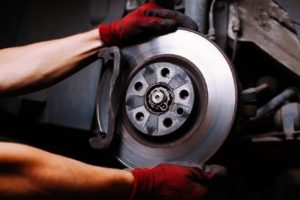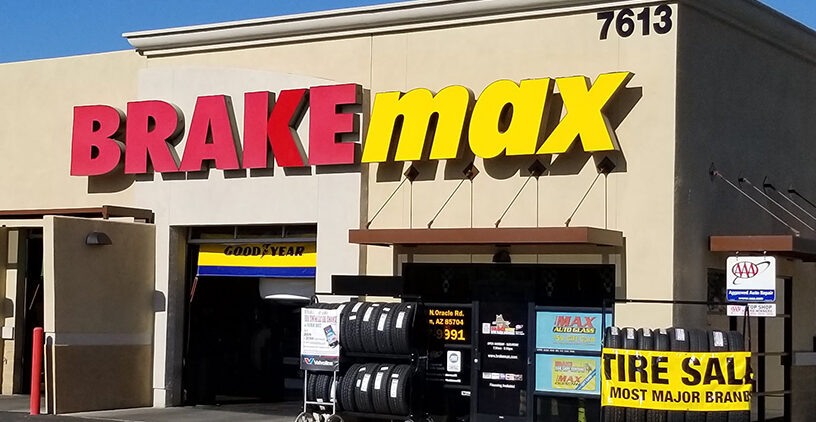Brake Caliper Facts Car Owners Must Know

Have you been a Tucson, Arizona-area driver for some time now? If so, you probably know brake pads are a crucial part of your vehicle’s braking system. Without these pads, your brake system would be unable to create the friction required to stop your car safely. Even so, it’s surprisingly easy to overlook the component that actually presses these pads against the rotor—brake calipers.
If you’re unsure what your brake calipers do or how to tell whether or not they’re in good shape, there’s no better time to learn than now. Keep reading for the BRAKEmax team’s complete list of brake caliper facts you need to know (and advice on what to do when these parts fail).
How Brake Calipers Work
These days, disc brakes are the most common automotive braking system. Brake calipers are a crucial element of these systems. These parts, which house your car’s brake pads and pistons, clamp onto your brake rotors when you push down on the brakes. That brings the brake pads into contact with your rotors and slows or stops your vehicle.
In general, the caliper assemblies are located inside your car’s wheels. They are connected to the master cylinder via hoses and tubes responsible for sending brake fluid through the brake system.
Along with these facts, it’s important to note that there are multiple types of brake calipers. These include:
- Floating brake calipers. Floating calipers include pistons on one side of the disc but not the other. However, they still have brake pads on both sides.
- Sliding brake calipers. A variation on the floating brake caliper design, sliding brake calipers function almost identically to their counterparts but are mounted to the caliper adapter.
- Fixed calipers. As their name suggests, fixed calipers are mounted to brackets and include no sliding pins. Generally speaking, these calipers are more effective than other varieties—but that performance typically comes at a higher cost.
Give Your Brake Calipers a Sharp Look
Of course, the functionality provided by brake calipers makes them an indispensable part of your vehicle. However, they can also affect the appearance of your car. If you’d like your brake calipers to stand out, you may want to consider using brake caliper paint. You can find this paint at most auto parts stores, and it can easily give your wheels a more sporty appearance.
Before applying brake caliper paint, ensure your calipers are dry and clean (and clean them with brake cleaner and a brush, if necessary). Then, mask off components like your brake hoses and brake rotors. When that’s done, you’ll be ready to apply your first coat of paint with a spray can or brush.
You can expect the first coat to be dry to the touch within 45 minutes; if you plan to apply extra coats, you’ll likely need to do so within an hour of applying the previous coat. When you’re done painting your brake calipers, wait 24 hours to let the last coat dry before operating your vehicle.
All About Brake Caliper Maintenance
Calipers are one of the longer-lasting components in any brake system—these parts can last up to a decade or 75,000-100,000 miles. Even so, your calipers may start having issues before their time comes. To significantly lower your risk of running into problems, it’s best to know some basic brake caliper maintenance tips.
While your brake pads will wear out much faster than your calipers, the calipers need to remain centered on the brake rotors to provide balanced pressure. Since there are various caliper designs out there, some are naturally more effective than others at achieving this goal.
To keep your calipers centered and otherwise functional, be sure your regular brake service includes caliper work. These components should be cleaned and greased with high temp brake grease. If they aren’t, your calipers could potentially get “locked,” giving only one of your brake pads the pressure it needs to push down on the rotor correctly.
Do you think your calipers might be having trouble, or do you just want to ensure they’re doing all right? If so, it’s best to know how to inspect these parts and the dust boots included with them. These covers are designed to protect your calipers’ pistons and side pins from moisture and dirt. If you notice any damage to the dust boots, you should disassemble the calipers and clean them on your own. Otherwise, visit a nearby brake shop for a full caliper and bracket replacement.

Know When Brake Calipers Need Attention
While they have a surprisingly long lifespan under normal circumstances, brake calipers aren’t immune to failure by any means. With that in mind, you should be aware of some prominent symptoms that could point to brake caliper issues.
If your caliper has a retracted piston, you may notice your car veering towards the side with operating brakes when the brakes are engaged. Your vehicle may also need more distance than usual to stop. On the other hand, engaged pistons can cause your car to veer towards the engaged brake while you drive.
In either case, this situation will generate excess heat and cause the affected brake pads to wear more quickly than they should. While caliper issues aren’t the only potential cause of this situation, you should definitely look into this possibility if you find yourself dealing with steering problems.
Many vehicular issues can cause brake fluid leaks, and caliper failure can easily trigger this situation. If your pistons are sufficiently damaged, they may not be able to seal as they should. You could find out about this situation by noticing a puddle of brake fluid under your vehicle, a warning light on your dashboard, or signs of uneven brake pad wear.
In extreme situations, your caliper bracket may completely snap. When this happens, you’ll hear a “clunking” noise while engaging your brakes. Since you cannot safely drive in this situation, find a place to stop as quickly as possible.
Other signs of possible caliper problems include:
- “Squeaking” or “squealing” sounds from your brakes
- An overly soft or hard brake pedal
- Needing to pump your brakes to get them to work correctly
Get the Best Brake Repair in Tucson
Usually, you shouldn’t need to spend much time thinking about the condition of your calipers. But since these car parts are susceptible to wear and tear, it’s best to have a plan for what to do if they encounter trouble. As a Tucson resident, there’s no better place to go for brake repair services than BRAKEmax.
By choosing BRAKEmax for your caliper work, you’ll enjoy benefits such as:
- Qualified brake shop mechanics. Finding skilled technicians is simpler than you might think—just look for mechanics that have earned their ASE certification. All the mechanics at BRAKEmax are ASE-certified, so you won’t have to worry about who’s looking at your vehicle’s brake system!
- An unbeatable reputation among people in Arizona. BRAKEmax has been around since 1997. In the decades since then, we’ve worked hard to provide quality auto repair and maintenance services to our neighboring people and companies.
- All the auto services you’ll need. BRAKEmax may be named after its brake services, but our expertise doesn’t stop there. You can also visit BRAKEmax for oil changes, preventative maintenance, and all sorts of other services.
- Exceptional customer service. Every BRAKEmax location includes a comfortable, well-kept waiting area for our customers. If you’d prefer to wait at home or your office, you can also take advantage of our complimentary shuttle service.
- Opportunities to save. Before your caliper repair starts, you can know how expensive this will be by getting a free quote. When it’s time to pay for your brake work, you can save big with our online coupons and financing opportunities.
When your brakes need maintenance or repairs, get all these perks and more by booking a brake service appointment with BRAKEmax!









